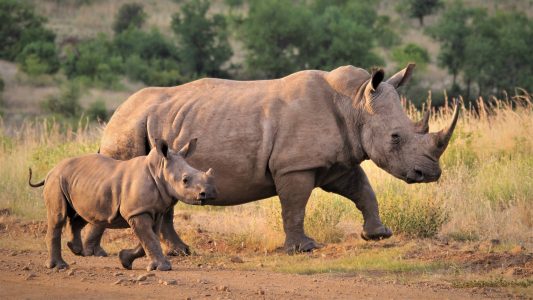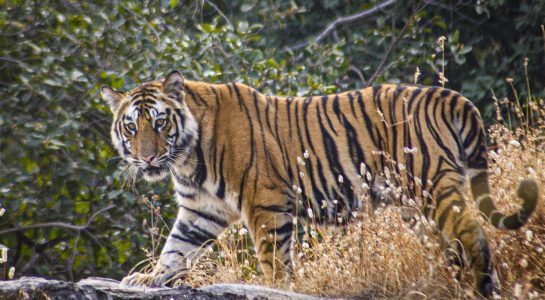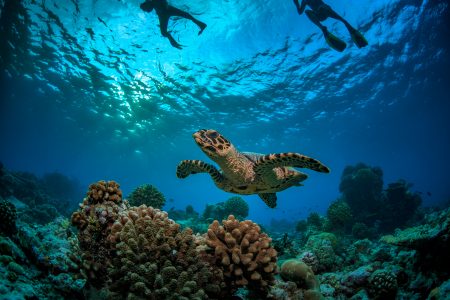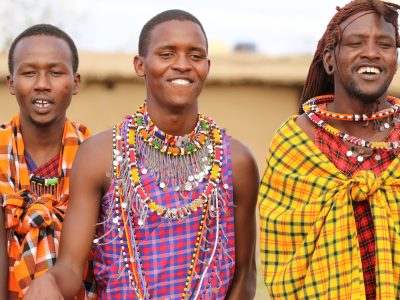Travel Responsibly: Explore the World, Protect Our Future
6 June 2025
Are you worried about the environmental legacy we’re leaving for future generations, yet feel helpless to make a difference? Do you sometimes feel a pang of guilt enjoying life’s pleasures amidst widespread environmental concerns? We get it. But here’s the good news: responsible travel has transformed. The question is no longer if we should explore. But how can we do so sustainably? Can travel help to protect the places on our travel bucket lists? Imagine enjoying incredible holidays while actively helping to protect the wild wonders of the countries you visit as you travel responsibly, and so ensure that these places and species will still be around for your grandchildren to visit and see.

A share of tourism income goes to local projects and rhino protection, inspiring communities to invest in wildlife stewardship and anti-poaching efforts.
The power of travel to protect wildlife
Your next adventure can be more than memorable—it can be a lifeline for conservation. When you travel responsibly, your choices directly fund the protection of wildlife and wild spaces.
Consider Kenya and Tanzania, where every safari booked and every lodge stayed in directly fuels vital conservation. Tourism revenue here isn’t just about fun; it’s the bedrock of national parks, the muscle behind anti-poaching units, and the source of crucial jobs for local communities.
In Kenya, tourism accounts for a contribution of around 4% to 5% of the nation’s GDP, supporting a staggering 1.6 million livelihoods. In Tanzania, tourism entirely funds the management of their spectacular national parks, providing essential income to remote rural areas. Your visit directly ensures these wild havens remain protected, giving local communities a powerful reason to safeguard them for generations.
But the impact extends even further. Your responsible travel choices also underpin groundbreaking initiatives like African Parks’ ambitious Rhino Rewild project. This isn’t just about moving rhinos; it’s about a monumental effort to rewild 2,000 southern white rhinos across secure African habitats over the next decade. This colossal undertaking — covering the immense costs of transport, veterinary care, and ongoing monitoring — relies heavily on income generated from responsible tourism.
By choosing ethical safari operators and travelling with purpose, you become an active participant in this incredible conservation story. You’re not just observing wildlife; you’re helping safeguard rhinos, restore delicate ecosystems, and ensuring these magnificent animals continue to roam free and thrive in the wild. Your journey truly makes a difference.
Land conservation through safari travel
In India, tourism-generated funds from Project Tiger help restore habitats, monitor wildlife, and promote coexistence between people and tigers.
Today, India is home to nearly 75% of the world’s wild tigers, demonstrating the impact of responsible travel and conservation funding on securing the future of both animals and their habitats.
Safari tourism is a key driver of land conservation in Kenya and Tanzania, where park fees and conservation levies provide essential funding for the protection and management of vast wilderness areas.
In Kenya, entry fees to reserves like the Masai Mara and Amboseli support anti-poaching patrols, habitat restoration, and the work of the Kenya Wildlife Service and community conservancies. These funds enable security teams, interagency anti-poaching units, and ecosystem management plans that protect elephants, rhinos, and other threatened species. In Tanzania, conservation fees from visitors to parks such as the Serengeti and Nyerere are crucial for maintaining park infrastructure, supporting wildlife research, and providing income for local communities, ensuring that tourism revenue is reinvested directly into the landscapes that attract travellers.
This funding model has inspired similar conservation efforts elsewhere. In South Africa, safari tourism supports rhino rehabilitation and rewilding projects, such as those led by the Singita Lowveld Trust and Care for Wild sanctuary, which rescue and release orphaned rhinos into protected reserves.
Wildlife and community: A symbiotic relationship
Responsible travel does more than protect wildlife—it uplifts the people who share these landscapes.
Across Africa, Sri Lanka, and India, safari tourism creates jobs for local guides, rangers, and artisans, while supporting small businesses and community-owned lodges. Revenue from park fees often funds schools, clinics, and clean water projects, improving daily life in rural areas.
Somak Luxury Travel donates money for each person who books a safari in Kenya to two charities that work in communities to encourage personal and social development.
When communities benefit directly, they become powerful allies in conservation.
In places like Zimbabwe and Namibia, a share of tourism income goes to local projects and rhino protection, inspiring communities to invest in wildlife stewardship and anti-poaching efforts. This partnership ensures that both nature and people thrive, making responsible travel a true force for good.
The Indian Ocean Islands: Ocean guardianship
Responsible marine tourism is making a real difference in the Indian Ocean, particularly around the Maldives, Mauritius, and Seychelles. In these island nations, eco-conscious resorts and tour operators actively support coral reef restoration, often working with scientists and local communities to rehabilitate damaged reefs and protect vital marine habitats. In the Maldives, for example, coral gardening projects have helped revive reef systems damaged by bleaching, while in Mauritius, marine reserves and sustainable snorkelling practices are giving coral and fish populations a chance to recover.
Travellers play a crucial role by choosing operators who prioritise reef-safe activities, reduce plastic waste, and educate guests about marine life. Many resorts now invite guests to participate in turtle monitoring, beach clean-ups, or citizen science initiatives, allowing visitors to contribute directly to conservation. These collective efforts not only safeguard endangered species like turtles and reef fish, but also help ensure that the vibrant underwater world remains healthy for future generations. By travelling responsibly, you become part of a growing movement that keeps the Indian Ocean’s marine treasures thriving.
How you can travel responsibly
Travelling responsibly is far easier – and infinitely more rewarding – than you might imagine. It’s about making conscious choices that align with your values, ensuring your footprint is light and your impact is positive. Seek out lodges genuinely committed to sustainability, with clear environmental policies and demonstrated support for local communities. Partner with tour operators who have transparent sustainability policies, employ local guides, and prioritise animal welfare, even considering opportunities to participate in conservation activities like wildlife monitoring or beach clean-ups where appropriate. Crucially, minimise your environmental footprint by reducing single-use plastics, conserving resources, respecting local customs, and treading lightly in sensitive habitats.
Every small decision, every mindful choice, adds up, transforming your holiday into a powerful contribution that helps ensure the vibrant, wild places we cherish remain protected and thriving for countless generations to come. Your journey truly is a gift to the planet.
The ripple effect of traveling responsibly
To come back to the question we began with about whether travel can protect the places we long to visit. Ultimately, the answer is yes—travel can protect the very places we long to visit, if we do it thoughtfully.
By choosing to travel responsibly, you become part of a global movement that safeguards wildlife, empowers communities, and preserves the magic of our planet for future explorers. So, as you plan your next adventure to Kenya’s savannahs, Tanzania’s wild parks, the jungles of Sri Lanka and India, or the turquoise waters of the Indian Ocean, remember: your journey can be part of the solution.
Read more about efforts around the world to save endangered species in our blog: Vanishing Wonders: Endangered Animals in Africa, India and Sri Lanka
Are you ready to start planning your next adventure? Speak to one of our travel experts and find out how you can travel responsibly by calling our reservations hotline on +442084233000 to get the ball rolling on your next holiday.
Sign up for our weekly Somak Luxury Travel newsletters for the latest trending travel offers and editorials to inspire your travel dreams by clicking on this link: Newsletter Sign Up
Contact
Somak House
Harrovian Business Village
Bessborough Road
Harrow On the Hill
HA1 3EX
Tel: +44 20 8423 3000
Email: info@somak.com
Opening times
| Mon - Fri | : | 9am to 6pm |
| Sat - Sun | : | Closed |







